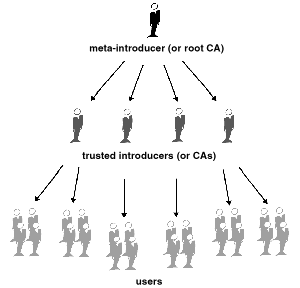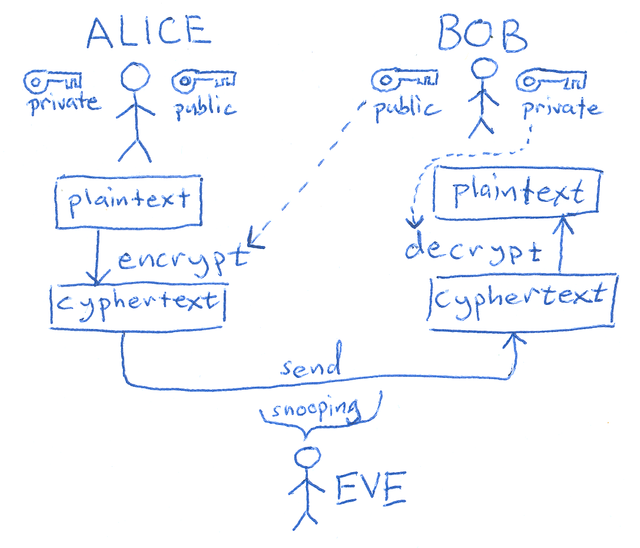In this catch from viaggi di nozze the Italian iconic actors Carlo Verdone and Claudia Gerini listening to some good heavy metal remember the most special situation where they have some good sex.
Like them, or better i wish it'll be, our two friends OpenBSD and GnuPG continue them relation. Last time we've seen how to install, generate master key and subkeys (sign, encryption and authentication) and backup all of them in an encrypted usb stick under OpenBSD. The result of those operation can be resumed and visualized with this command:
$ gpg2 --list-keys
/home/taglio/.gnupg/pubring.kbx
-------------------------------
pub rsa4096/0xAD8E487FF2F05FDE 2018-02-23 [SC]
Key fingerprint = 6ACF BE8E 6C24 EA90 3F5B 9F49 AD8E 487F F2F0 5FDE
uid [ultimate] No Place No Address (No Place No Address) <[email protected]>
sub rsa4096/0x3C423C42DE438790 2018-02-23 [E]
sub rsa4096/0x5DC3DAEF3359F361 2018-02-23 [S]
sub rsa4096/0x52E923E51A16A5E9 2018-02-23 [A]
$
Export the public key to the Internet

To publish our public key to the Internet allowing others OpenPGP users establish a secure channel of communication with us (i know it's not perfect but combined with other technologies it's the state of the art) we've to export our public key 0xAD8E487FF2F05FDE to one the keyserver of the pgp network . Let's start with our shell sex:
$ wget -P ~/.gnupg https://sks-keyservers.net/sks-keyservers.netCA.pem{,.asc}
$ chmod -R 700 .gnupg
$ openssl verify -trusted sks-keyservers.netCA.pem -check_ss_sig sks-keyservers.netCA.pem
sks-keyservers.netCA.pem: OK
$ openssl x509 -in sks-keyservers.netCA.pem -noout -text | grep "X509v3 Subject Key Identifier" -A1 | tail -n1 E4:C3:2A:09:14:67:D8:4D:52:12:4E:93:3C:13:E8:A0:8D:DA:B6:F3
We download the CAcertificate of the keyservers pool sks-keyservers.net
with its PGP signature (.asc file). We verify it with the openssl suite and then we extract the "X509v3 Subject Key Identifier" and check if it is the same with the one that we've here.
$ host -t a hkps.pool.sks-keyservers.net
hkps.pool.sks-keyservers.net has address 193.164.133.100
$ cat << EOF >> ~/.gnupg/gpg.conf
keyserver hkps://193.164.133.100
EOF
$ cat << EOF > ~/.gnupg/dirmngr.conf
keyserver hkps://193.164.133.100
hkp-cacert ~/.gnupg/sks-keyservers.netCA.pem
EOF
Like you can see we've just added one new directive in our gpg.conf file after resolving the pool of keyservers sks in a single ipv4 address. Next we've created a new configure file for dirmngr that is the daemon resposible of the access to the OpenPGP keyservers
$ gpg2 --send-key 0xAD8E487FF2F05FDE
gpg: sending key 0xAD8E487FF2F05FDE to hkp://193.164.133.100
$ gpg2 --fingerprint 0xAD8E487FF2F05FDE | grep finger | head -n 1
Key fingerprint = 6ACF BE8E 6C24 EA90 3F5B 9F49 AD8E 487F F2F0 5FDE
this is the normal command to transfer our pubkey who owner is [ultimate] No Place No Address (No Place No Address) <[email protected]>; after some minutes we can search our public key in the OpenPGP network here.
Encryption using public key is AWESOME
We want to establish a secure communications channel between [email protected] and r.giuntoli@protonmail, without public key encription and signing will give us a lot of headchache. Using it produce this esquema:

In practice never Alice or Bob have to send in an insecure channel, like Internet, their private keys. In my example alice got a Gentoo workstation, and Bob an OpenBSD one. The two folks have uploaded their public keys using the OpenPGP suite. The two trust each one and can verify the fingerprint of the other utilizing a secure channel, like they are in the same room creating this example.
alice$ gpg --search-keys npna
gpg: data source: http://37.191.226.104:11371
(1) No Place No Address (No Place No Address) <[email protected]>
4096 bit RSA key 0xAD8E487FF2F05FDE, created: 2018-02-23
Keys 1-1 of 1 for "npna". Enter number(s), N)ext, or Q)uit > 1
gpg: key 0xAD8E487FF2F05FDE: public key "No Place No Address (No Place No Address) <[email protected]>" imported
gpg: Total number processed: 1
gpg: imported: 1
alice $ gpg --edit-key 0xAD8E487FF2F05FDE
gpg (GnuPG) 2.2.5; Copyright (C) 2018 Free Software Foundation, Inc.
This is free software: you are free to change and redistribute it.
There is NO WARRANTY, to the extent permitted by law.
pub rsa4096/0xAD8E487FF2F05FDE
created: 2018-02-23 expires: never usage: SC
trust: unknown validity: unknown
sub rsa4096/0x3C423C42DE438790
created: 2018-02-23 expires: never usage: E
sub rsa4096/0x5DC3DAEF3359F361
created: 2018-02-23 expires: never usage: S
sub rsa4096/0x52E923E51A16A5E9
created: 2018-02-23 expires: never usage: A
[ unknown] (1). No Place No Address (No Place No Address) <[email protected]>
gpg> fpr
pub rsa4096/0xAD8E487FF2F05FDE 2018-02-23 No Place No Address (No Place No Address) <[email protected]>
Primary key fingerprint: 6ACF BE8E 6C24 EA90 3F5B 9F49 AD8E 487F F2F0 5FDE
gpg> sign
pub rsa4096/0xAD8E487FF2F05FDE
created: 2018-02-23 expires: never usage: SC
trust: unknown validity: unknown
Primary key fingerprint: 6ACF BE8E 6C24 EA90 3F5B 9F49 AD8E 487F F2F0 5FDE
No Place No Address (No Place No Address) <[email protected]>
Are you sure that you want to sign this key with your
key "Riccardo Giuntoli <[email protected]>" (0xA51D8EF938AF47D0)
Really sign? (y/N) y
gpg> save
alice$
So we search the public key of Alice in the keyserver , in this case we've got only a possible key, we select pressing 1 at the OpenPGP shell. Next we enter in edid mode and always at the OpenPGP shell and we see that also Bob have created three subkeys one for encryption, another for signing and the last for authentication. We print the fingerprint to validate it with Bob to locally sign it with the option sign . We save and the returl to the bash shell.
We do the same process in the Bob OpenBSD machine:
bob$ gpg2 --search-key r.giuntoli
gpg: data source: http://18.9.60.141:11371
(1) Riccardo Giuntoli <[email protected]>
4096 bit RSA key 0x6DAE5C27DFAF0D6F, created: 2018-02-20
(2) ANTRAX <[email protected]>
3072 bit RSA key 0xAAE9F49A70ED3F09, created: 2017-09-04
(3) Riccardo Giuntoli (MESWIFI, S.L.) <[email protected]>
2048 bit RSA key 0x83D1285CD6F38DFA, created: 2014-01-26
Keys 1-3 of 3 for "r.giuntoli". Enter number(s), N)ext, or Q)uit > 1
gpg: key 0x6DAE5C27DFAF0D6F: public key "Riccardo Giuntoli <[email protected]>" imported
gpg: Total number processed: 1
gpg: imported: 1
bob$ gpg2 --edit-key r.giuntoli
gpg (GnuPG) 2.1.23; Copyright (C) 2017 Free Software Foundation, Inc.
This is free software: you are free to change and redistribute it.
There is NO WARRANTY, to the extent permitted by law.
pub rsa4096/0x6DAE5C27DFAF0D6F
created: 2018-02-20 expires: never usage: SC
trust: unknown validity: full
sub rsa2048/0xA51D8EF938AF47D0
created: 2018-02-20 expires: never usage: S
sub rsa2048/0x32772E38B5C56D73
created: 2018-02-20 expires: never usage: E
sub rsa2048/0xE3E741619E88263B
created: 2018-02-20 expires: never usage: A
[ full ] (1). Riccardo Giuntoli <[email protected]>
gpg> fpr
pub rsa4096/0x6DAE5C27DFAF0D6F 2018-02-20 Riccardo Giuntoli <[email protected]>
Primary key fingerprint: 90DC 1D49 FC85 DD2E 38AC 5301 6DAE 5C27 DFAF 0D6F
gpg> sign
pub rsa4096/0x6DAE5C27DFAF0D6F
created: 2018-02-20 expires: never usage: SC
trust: unknown validity: full
Primary key fingerprint: 90DC 1D49 FC85 DD2E 38AC 5301 6DAE 5C27 DFAF 0D6F
Riccardo Giuntoli <[email protected]>
Are you sure that you want to sign this key with your
key "No Place No Address (No Place No Address) <[email protected]>" (0xAD8E487FF2F05FDE)
Really sign? (y/N) y
gpg>save
bob$
In this case the reply at our search are three diferents keys, we install the first.
alice$ echo "Я хочу встретиться с тобой" | gpg --armor --sign --encrypt -r npna -
gpg: checking the trustdb
gpg: marginals needed: 3 completes needed: 1 trust model: pgp
gpg: depth: 0 valid: 1 signed: 0 trust: 0-, 0q, 0n, 0m, 0f, 1u
gpg: 0x3C423C42DE438790: There is no assurance this key belongs to the named user
sub rsa4096/0x3C423C42DE438790 2018-02-23 No Place No Address (No Place No Address) <[email protected]>
Primary key fingerprint: 6ACF BE8E 6C24 EA90 3F5B 9F49 AD8E 487F F2F0 5FDE
Subkey fingerprint: 2754 CF0A D8FA 32DD 1123 EF25 3C42 3C42 DE43 8790
It is NOT certain that the key belongs to the person named
in the user ID. If you *really* know what you are doing,
you may answer the next question with yes.
Use this key anyway? (y/N) y
-----BEGIN PGP MESSAGE-----
hQIMAzxCPELeQ4eQAQ/8CzGw9ms0lyHcinfJptV3ICjUIrDxSHEDlj7L5oME1tc0
7BEuURJcqP6ftuU/OK8oQipKw+TBbioDIjNNnWVlpPGhSyHZl8tRnUyOKhQDcGEU
8KWk9wZfwElBVBAbqhfsih5dBIGgmZwvA9iVJrdvXv8uA7OD2qNsiD7SLG1XaemN
un8FnlRptYvwnR4/FEESf4FNeYUki0SwE3PDQb1c1uxTBILSavontFmUwxEhVyKB
2gV8SB2XtiN+WvxJDNlnuEI9NUM46XjNZVew9Iam78PAro/dcXxkD+PkY4Z8aXNB
ugIrym5//4vE7uTskT8qh0m4dlfDgnhuojFWjwSMdedntU09tNy5uMQMbqJkKmSV
8J4qfCVTtp9UtKgA/Ylqmw4TyAsZ+r8TZYgMtbTF3VTOGiXk5fSd5cjNUsAhDPWI
PR0+IrdumfTDoUdXX9SXZrJ8ftlFuVkj8II5Zm7wXbbXO3wTrzAZZTmZL0NoHkca
BKGp11rWk4MgpxwYQKsCI1LZc/q2Ve7PsviN57nmeiDGLGP1AgOqVVJP1LNEPLvs
7xlTDlviALdJXKR3rwww+iwFFLwdE7V7GO4pw5z/Wgxgsx2WlFbOPG6FnJmeW22D
xCQm4NDJvVLnmI6fa8Y2JPzZVFou7bJxEgnGWwoXGdT8b+S10DWxNlAxKKh+svLS
wPEBJYi7+I0iY1gucLhLnKDnTd1XV9POHt/kT2uSb7INZedd221lqLw327aqFpo+
anrVtodShpg3CQM9mC/VX5/tYh/4YqupR+TAmlXvscbjNEy19gjbTjhhO80c1dla
axeLsA6OuDh77arEyk1gzlEFHl2ebUSZjBVNG7nFAMur9hS22TBSOmGHdgEH4w4z
pPCk3dAnqOBdgXCOrt8a9MHDXmg6RqkpclXAK/X/EOtx0JouNQUSXjyakzrKffKF
KtkUGsTyH8wUAlJb2X/enOi89b2VBHgqqy4ss9B3Do1sYpgLo3Ho9oGqpxt0oaiZ
pnIq2jZdns8kdtsEJsQTnN/ucu4L+/MzDGjUAdP7vC94in62gqypnaNhYzpyHrS+
H8p+ddtWoYEZHnp/TuqqdSw3psDzhA9UyWFa1BKTOczI3CBFhoio/NPdK4bvnNdw
Ef9gP4kVaCIDh6QOQV5xJtKgTU53alu76xlyZcyBqP4q6fk94klVxkb1G5lmP60I
HLXQvFuTaGF8BTZqNYsNZlOS0B5plXMYCw1s4hX6n2h+4HgbOg71cHaTTIw5IRls
qk2g
=i1ah
-----END PGP MESSAGE-----
Alice encrypt and sign the message Я хочу встретиться с тобой for Bob. The process is simple, she piped it to gpg that is launched with:
--armorthe result of the process have to be always text.--signshe sign it with hersubkeydedicated to the sign operation.--ecryptshe encript it.-r Bobthe message will only readable by Bob (that seems to be russian).-it indicate togpgthat the text in input was piped.
Now she use a free past service to upload it to the Internet, the result is there:
ghostbin free past service, a message for you darling
So Bob is very exited and want to rapidly verify and decrypt his love message:
bob$ wget https://ghostbin.com/paste/28fqm/raw -o log -O testmsg
bob$ cat testmsg | gpg2 --decrypt
gpg: encrypted with 4096-bit RSA key, ID 0x3C423C42DE438790, created 2018-02-23
"No Place No Address (No Place No Address) <[email protected]>"
Я хочу встретиться с тобой
gpg: Signature made Tue Mar 6 18:49:14 2018 CET
gpg: using RSA key E9664F440C5E14C8E661AC6BA51D8EF938AF47D0
gpg: Good signature from "Riccardo Giuntoli <[email protected]>" [full]
Primary key fingerprint: 90DC 1D49 FC85 DD2E 38AC 5301 6DAE 5C27 DFAF 0D6F
Subkey fingerprint: E966 4F44 0C5E 14C8 E661 AC6B A51D 8EF9 38AF 47D0
bob$
Silently download the message and save in local testmsg text file and use gpg --decrypt to read his message.
OpenPGP others applications and a little bit of magic
g)
With the OpenPGP suite we can also simply encrypt a file or folder.
But Bob want to be more 31337 and want to hide a secret message in an image, embedding in it using a technology knowned as Steganography. And with OpenBSD is a nice and rapid task.
bob$ doas pkg_add -U steghide
doas ([email protected]_domain) password:
quirks-2.367 signed on 2017-10-03T11:21:28Z
steghide-0.5.1p3: ok
bob$ steghide
steghide version 0.5.1
the first argument must be one of the following:
embed, --embed embed data
extract, --extract extract data
info, --info display information about a cover- or stego-file
info <filename> display information about <filename>
encinfo, --encinfo display a list of supported encryption algorithms
version, --version display version information
license, --license display steghide's license
help, --help display this usage information
embedding options:
-ef, --embedfile select file to be embedded
-ef <filename> embed the file <filename>
-cf, --coverfile select cover-file
-cf <filename> embed into the file <filename>
-p, --passphrase specify passphrase
-p <passphrase> use <passphrase> to embed data
-sf, --stegofile select stego file
-sf <filename> write result to <filename> instead of cover-file
-e, --encryption select encryption parameters
-e <a>[<m>]|<m>[<a>] specify an encryption algorithm and/or mode
-e none do not encrypt data before embedding
-z, --compress compress data before embedding (default)
-z <l> using level <l> (1 best speed...9 best compression)
-Z, --dontcompress do not compress data before embedding
-K, --nochecksum do not embed crc32 checksum of embedded data
-N, --dontembedname do not embed the name of the original file
-f, --force overwrite existing files
-q, --quiet suppress information messages
-v, --verbose display detailed information
extracting options:
-sf, --stegofile select stego file
-sf <filename> extract data from <filename>
-p, --passphrase specify passphrase
-p <passphrase> use <passphrase> to extract data
-xf, --extractfile select file name for extracted data
-xf <filename> write the extracted data to <filename>
-f, --force overwrite existing files
-q, --quiet suppress information messages
-v, --verbose display detailed information
options for the info command:
-p, --passphrase specify passphrase
-p <passphrase> use <passphrase> to get info about embedded data
To embed emb.txt in cvr.jpg: steghide embed -cf cvr.jpg -ef emb.txt
To extract embedded data from stg.jpg: steghide extract -sf stg.jpg
bob$ wget https://pbs.twimg.com/profile_images/966976157592838145/bzhg-p3s_400x400.jpg -o log
bob$ cat << EOF > msg
trip lover trust
EOF
bob$ steghide embed -cf bzhg-p3s_400x400.jpg -ef msg
Enter passphrase:
Re-Enter passphrase:
embedding "testmsg" in "bzhg-p3s_400x400.jpg"... done
bob$
To obtain this little magic, Bob install steghide from the official ports of OpenBSD, next he write a text message and embedded protected with a password in the jpeg image.
Now he saves the jpg image in his harddisk with gpg and symmetric encryptions. When he will send to Alice he will decrypt it and reuse the public method.
bob$ gpg2 --symmetric bzhg-p3s_400x400.jpg
Nice, i'm in love with this Bob and Alice story, i'm in love with my work that is and will be write about security stuff, protecting privacy for who want it.
love is back, RG